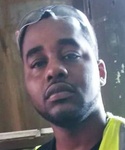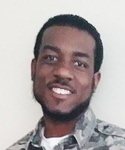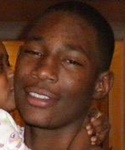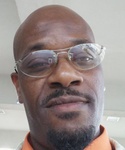By FRAN SPIELMAN
Chicago Sun-Times

Slain teacher Betty Howard is inspiring a movement to revitalize Chatham. On Wednesday her brother, Orlando Long, a Chicago Police officer, on the left, and her son, James Washington, a truck driver, attended a press conference announcing the effort. | Fran Spielman/Sun-TImes
Not a day or even an hour goes by when James Washington doesn’t grieve for his mother, Betty Howard, a beloved special education teacher caught in the crossfire between rival gangs two years ago on a once-thriving Chatham commercial strip.
Last Wednesday was the exception. It was a day to celebrate Betty Howard.
Her murder—in broad daylight by a bullet that went through the wall of a real estate office where Howard worked a second job—had started a movement that may someday restore a neighborhood that was once the paragon of the black middle-class.
The so-called Greater Chatham Initiative is a massive public-private partnership with a noble mission: To break down “silos” and harness the resources of government agencies, social services, community groups and private investors to bring jobs, businesses, housing and public safety to Chatham and the nearby communities of Auburn-Gresham, Greater Grand Crossing and Avalon Park.

Betty Howard and her son, James Washington | Facebook
“It’s like a good hurt. It’s painful. I don’t think it’ll ever change because she’s not here. But hopefully, it’s a positive out of a negative,” said Washington, who still lives in his mother’s Chatham home.
“She was a people person. She loved to help others. She’d go the extra mile. She put forth an extra effort with everything. She was not a selfish person. She would love the fact that she is honored and she touched so many people.”
Howard’s brother knows better than anyone how far Chatham has fallen since its heyday in the 1950’s and ‘60’s. Orlando Long is a 19-year-veteran Chicago Police officer.
“Chatham right now is at an all-time low … It’s pretty much just violence-related, gang related … I don’t know if the pillars or the older families that moved out of the community caused the younger adults to come in and cause the violence that’s going on today. But something took place. There was a turn,” Long said.
“But now that we have more people involved, more elected officials, maybe we can bring it back to what it used to be. I don’t think it’s an overnight thing. It’s gonna take some time. But as we take the small steps, it’ll end up in a bigger outcome. My sister would very well love this. Just to know that, behind her, there was something bigger.”
The prime mover behind Wednesday’s announcement was U.S. Rep. Bobby Rush.
When the 58-year-old special ed teacher at Gwendolyn Brooks College Prep was killed down the street from Rush’s office—one of seven murders over a 20-month period along the same stretch between 5 p.m. and 4 a.m.—the South Side congressman had seen enough.
He summoned every elected official, community leader and business person he knew to a meeting that was more like a command performance.

Mayor Rahm Emanuel, U.S. Rep. Bobby Rush and Nedra Fears, executive director of the Greater Chatham Initiative, at press conference. | Fran Spielman/Sun-Times
Mayor Rahm Emanuel and Cook County Board President Toni Preckwinkle put their frosty relationship aside and threw the weight of city and county government behind it.
Michael Sacks, Emanuel’s chief fundraiser, friend and business adviser, rearranged his schedule to be there and donated so much money to the effort, Rush wanted to name an award after Sacks.
CTA Board Chairman Terry Peterson and City Treasurer Kurt Summers, sons and grandsons of Chatham, both said the effort was “personal” to them, as it was to Rush.
“Today marks a new beginning for the center of the South Side of Chicago—communities that have, for far too long, suffered from disinvestment and economic disruptions of every kind,” Rush said.
Rush harkened back to a happier time when Chatham was “the place to live for the Baby Boomer generation—my generation.”
“Everybody thought they would have to live in Chatham in order to be recognized as having arrived … Chatham was the community that we all aspired to live in, to raise our families in, to recreate in,” Rush said.
“Today, we are announcing the plan to restore the name and prominence … to their rightful place at the top of Chicago’s aspiring middle-class … This work will be a model for the entire nation as it struggles with how to revitalize its urban areas.”
Nedra Fears will serve as the first-ever executive director of the Greater Chatham Initiative. She will coordinate and manage more than 30 programs and partnerships, including the Greater Chatham Workforce Center, the Neighborhood Housing Resources Center and expanded youth programming for elementary school students.
She’ll help attract venture capital and create an “online presence” for local retailers who don’t even have a website.
During the grand unveiling at a Chatham movie theater built with help from millions in tax-increment financing, Fears told the moving story of what happened when her police officer father was gunned down in the line of duty.
“Mayor [Richard J.] Daley said, `If you ever needed anything, please let me know.’ So, my mom called him up and said, `I need to get a house in Chatham.’ And like what Chicago does best, he made it happen,” Fears said.
Now, it’ll be up to Fears to make it happen for Chatham and restore the once-proud community to its former glory.
“As a child, I took this wonderful middle-class African-American community for granted. I assumed that its robust business sector, Johnson Products, Soft-Sheen, Seaway National Bank, would never go away. I know now that Greater Chatham peaked in the 1970’s,” she said.






